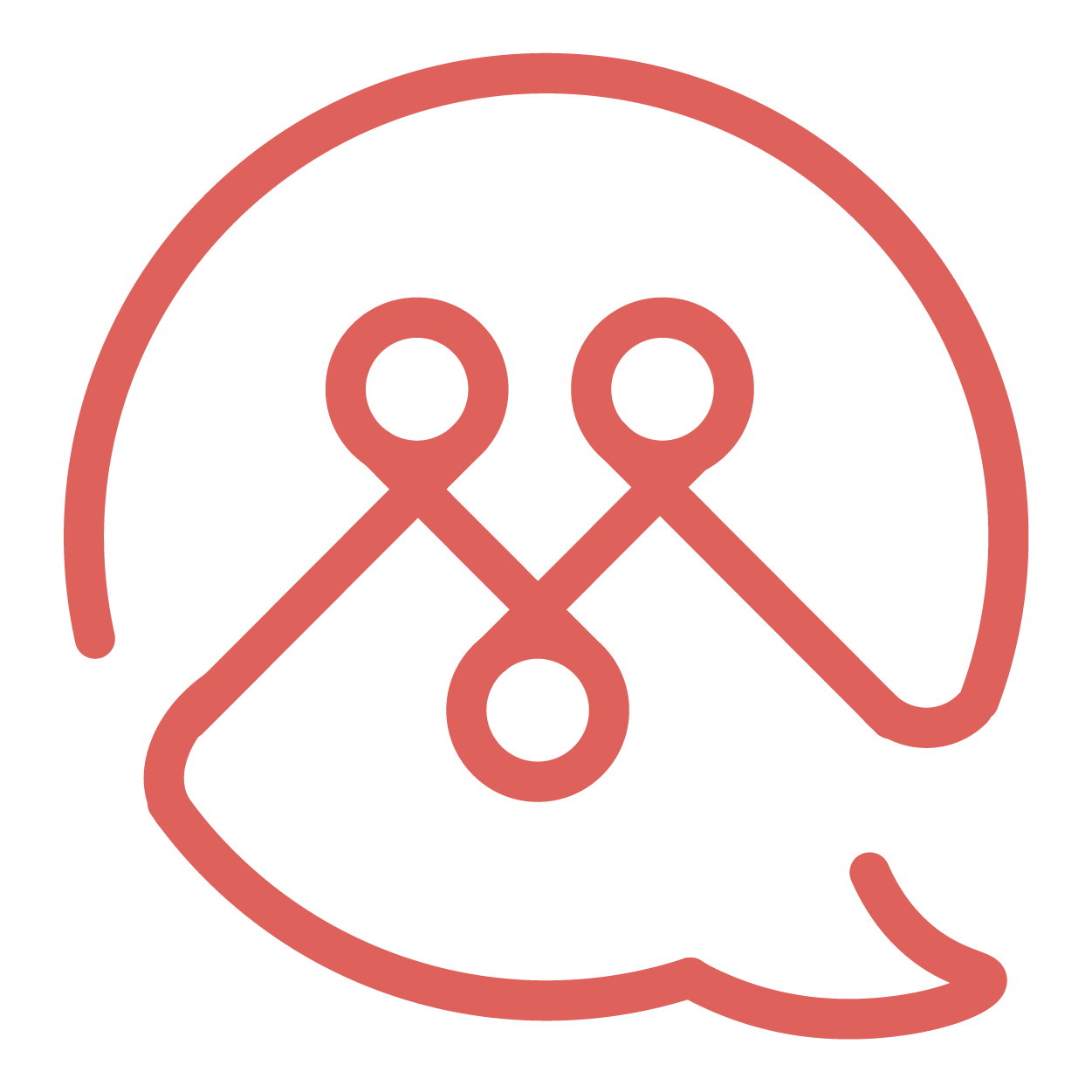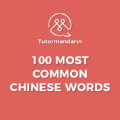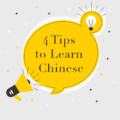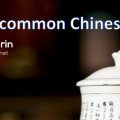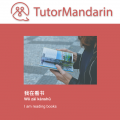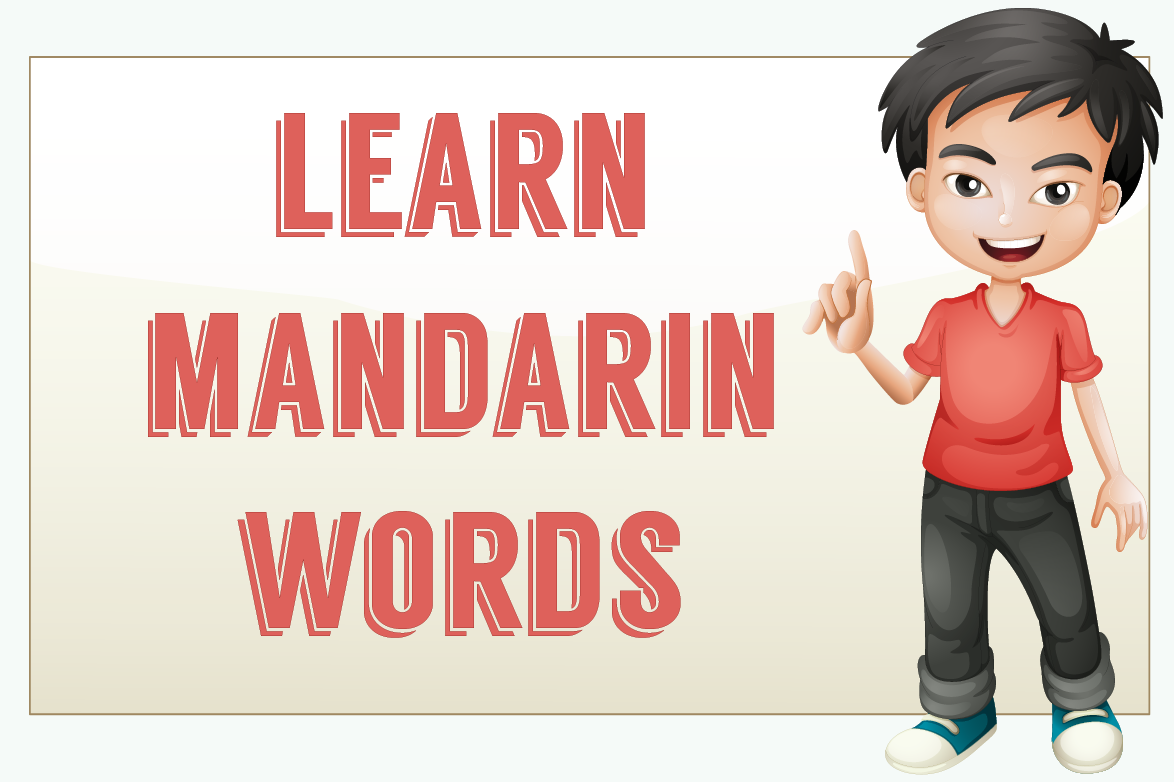
Contents
Learn Mandarin Words
So you’re starting to learn Chinese and you need to learn Mandarin words! No problem, TutorMandarin has got you covered.
We’ve selected 200 beginners words from our Beginner 1 Chinese course for you. These are good for the first level of Chinese learner who has already learned pinyin and is looking to expand their vocabulary to the first 200 words of the Chinese language. Each word comes with the Chinese vocabulary word, Pinyin of the Chinese, Part of Speech, English definition, and a translated example sentence.
If you’re having a good time learning these, please sign up to see also these words incorporated into our PDF lessons that also include grammar, exercises, conversations and more!
TutorMandarin Lessons
The vocabulary and example sentences come from our lessons. A lesson teaches you vocabulary around the concept of a certain theme. Combine 8-10 words with 2-3 grammar points and a conversation and now you’ve got a learning experience! This comprehensive format helps you learn the words in context and apply them practically in your daily life.
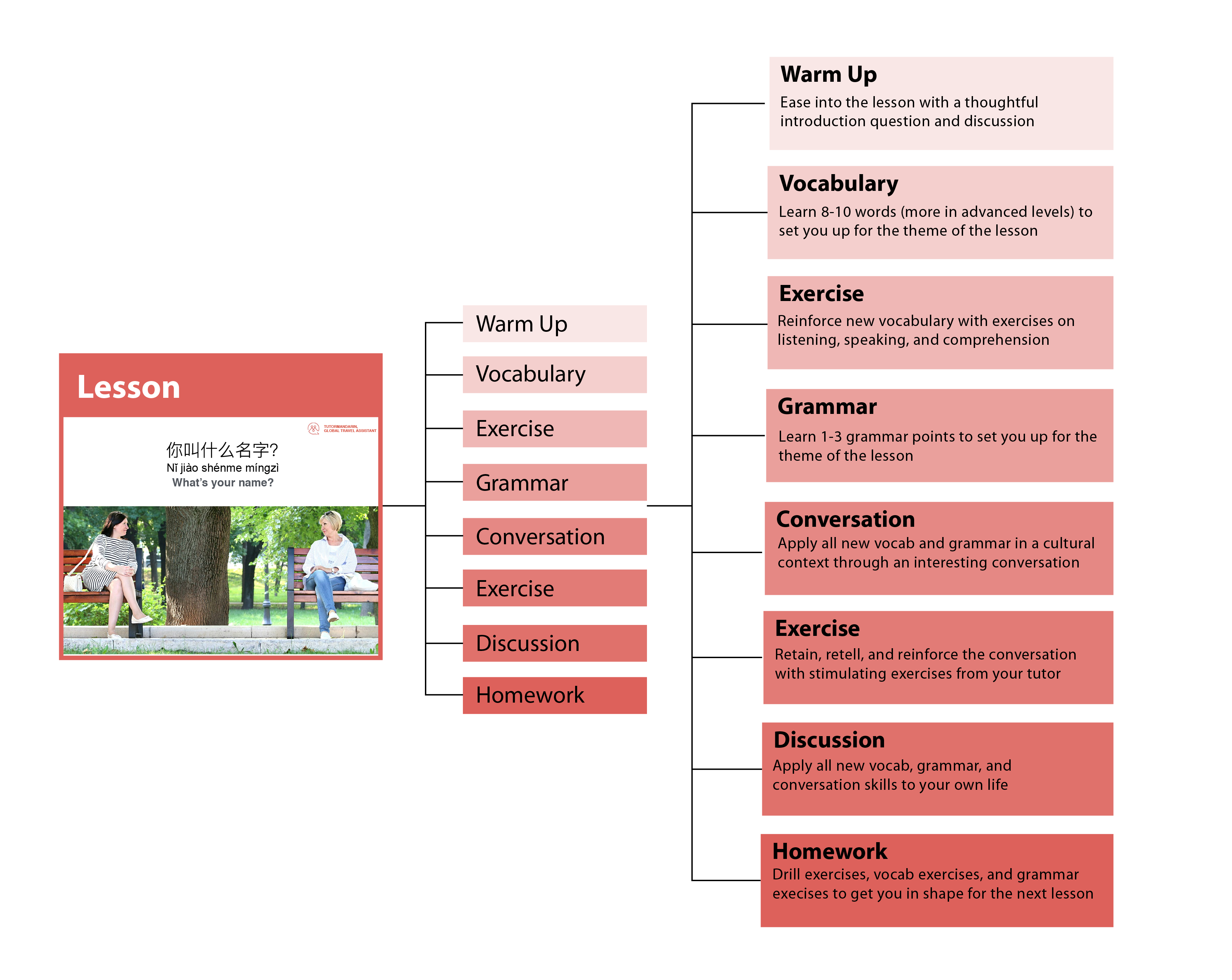
TutorMandarin Chinese Courses
The next step is the courses. TutorMandarin courses are generally made up of 45 Chinese lessons and are equivalent to passing 1 HSK level, even though you can take courses in Spoken Chinese, Kids Chinese, Business Chinese, and more. There are 5 lessons in a row according to the above format, and then a review lessons making sure you’re retaining all your learning and are applicable to flexibly apply it to your own life!
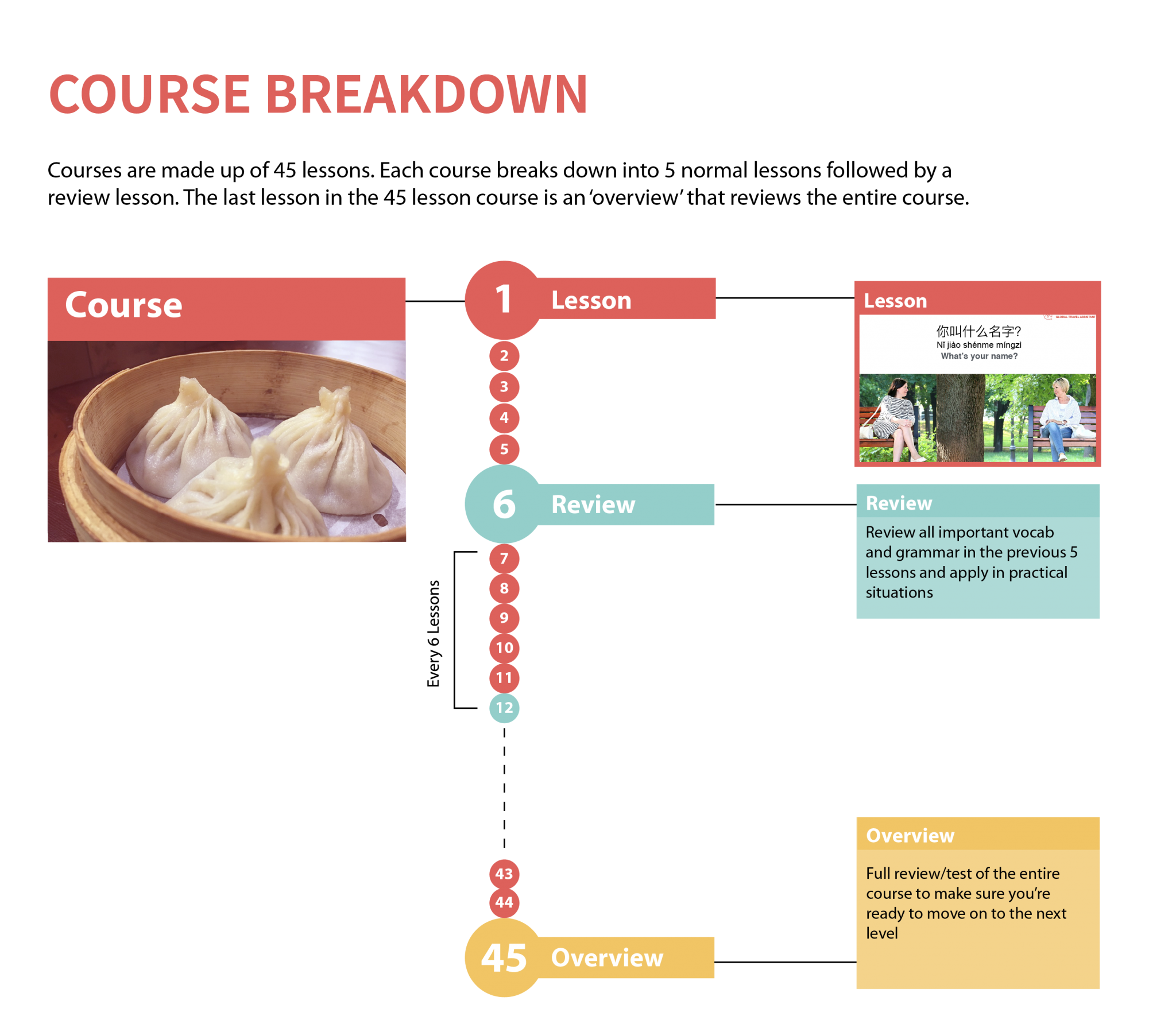
chinese curriculum overview
Learn Mandarin Words
Ok, enough about us! Enjoy 200 beginner Chinese words that will help you get started on your Mandarin learning journey.
| Chinese | Pinyin | Part | Definition | Chinese Example | Pinyin Example | English Example |
| 叫 | jiào | Verb | to be called | 我叫大卫。 | Wǒ jiào Dàwèi. | My name is David. |
| 姓 | xìng | Noun/Verb | surname, one’s family name is | 我姓程。 | Wǒ xìng chéng. | My surname is Cheng. |
| 名字 | míngzi | Noun | name | 她的名字是玛丽。 | Tā de míngzi shì Mǎlì. | Her name is Mary. |
| 哪国人 | nǎguórén | Phrase | a person of which country | 你是哪国人? | Nǐ shì nǎ guó rén? | Which country are you from? |
| 你 | nǐ | Pronoun | you | 你姓程 吗? | Nǐ xìng chéng ma? | Is your surname Cheng? |
| 我 | wǒ | Pronoun | I, me | 我不姓程。 | Wǒ bú xìng Chéng. | My surname is not Cheng. |
| 认识你很高兴 | rènshì nǐ hěn gāoxìng | Phrase | It’s nice to meet you | 我叫大卫, 认识你很高兴。 | Wǒ jiào dàwèi, rènshì nǐ hěn gāoxìng. | My name is David. It is nice to meet you. |
| 是 | shì | Verb | is | 我不是美国人, 我是日本人。 | Wǒ bú shì Měiguó rén,wǒ shì Rìběn rén | I’m not American, I’m Japanese. |
| 美国 | Měiguó | Noun | United States | 他是美国人吗? | Tā shì Měiguó rén ma? | Is he an American? |
| 中国 | Zhōngguó | Noun | China | 我不是中国人。 | Wǒ bú shì Zhōngguó rén. | I’m not Chinese. |
| 忙 | máng | Adj | busy | 你忙吗? | Nǐ máng ma? | Are you busy? |
| 累 | lèi | Adj | tired, tiring | 我很累。 | Wǒ hěn lèi. | I am tired. |
| 好 | hǎo | Adj | good | 你好吗? | Nǐ hǎo ma? | How are you? |
| 你们 | nǐmen | Pronoun | you (plural), y’all | 你们都是学生吗? | Nǐmen dōu shì xuéshēng ma? | Are you all students? |
| 学生 | xuéshēng | Noun | student, students | 我不是学生。 | Wǒ bú shì xuéshēng. | I am not a student. |
| 老师 | lǎoshī | Noun | teacher | 我的老师不是中国人。 | Wǒ de lǎoshī bú shì Zhōngguó rén. | My teacher is not Chinese. |
| 再见 | zàijiàn | Phrase | goodbye | 再见! | Zàijiàn. | Goodbye. |
| 日本 | Rìběn | Noun | Japan | 他不是日本人。 | Tā bú shì Rìběn rén. | He is not Japanese. |
| 他 | tā | Pronoun | He, him | 他累不累? | Tā lèi búlèi? | Is he tired or not? |
| 要 | yào | Verb | to want | 我要喝咖啡。 | Wǒ yào hē kāfēi. | I want to drink coffee. |
| 喜欢 | xǐhuan | Verb | to like | 我喜欢中国茶。 | Wǒ xǐhuan Zhōngguó chá. | I like Chinese tea |
| 喝 | hē | Verb | to drink | 我很喜欢喝中国茶。 | Wǒ hěn xǐhuan hē Zhōngguó chá. | I really like to drink Chinese tea. |
| 吃 | chī | Verb | to eat | 你喜欢吃什么? | Nǐ xǐhuan chī shénme? | What do you like to eat? |
| 咖啡 | kāfēi | Noun | coffee | 你喜不喜欢喝咖啡? | Nǐ xǐ bùxǐhuan hē kāfēi? | Do you like to drink coffee? |
| 菜 | cài | Noun | dish, cuisine | 你喜欢哪国菜? | Nǐ xǐhuan nǎ guó cài? | Which country’s food do you like? |
| 茶 | chá | Noun | tea | 我很喜欢喝茶。 | Wǒ hěn xǐhuan hē chá. | I really like to drink tea. |
| 口 | kǒu | Measure word | measure word for family members | 我家有三口人 | Wǒ jiā yǒu sān kǒu rén. | There are three people in my family. |
| 个 | gè | Measure word | general measure word, measure word for people | 我有两个妹妹。 | Wǒ yǒu lǐang gè mèimei. | I have two younger sisters. |
| 爸爸 | bàba | Noun | father | 我的爸爸有一个姐姐。 | Wǒ de bàba yǒu yí gè jiějie. | My father has an older sister. |
| 妈妈 | māma | Noun | mother | 他的妈妈是玛丽。 | Tā de māma shì Mǎlì. | His mother is Mary. |
| 哥哥 | gēge | Noun | older brother | 我有两个哥哥。 | Wǒ yǒu liǎng gè gēge. | I have two older brothers. |
| 姐姐 | jiějie | Noun | older sister | 他的姐姐叫玛丽。 | Tā de jiějie jiào Mǎlì. | His older sister is called Mary. |
| 弟弟 | dìdi | Noun | younger brother | 你有没有弟弟? | Nǐ yǒu méiyǒu dìdi? | Do you have younger brothers? |
| 妹妹 | mèimei | Noun | younger sister | 你的妹妹叫什么名字? | Nǐ de mèimei jiào shénme míngzì? | What is your younger sister’s name? |
| 家 | jiā | Noun | home, family | 我家有三口人。 | Wǒ jiā yǒu sān kǒu rén. | There are three people in my family. |
| 和 | hé | Conj | and | 我有一个哥哥和一个姐姐。 | Wǒ yǒu yí gè gēge hé yí gè jiějie. | I have an older brother and an older sister. |
| 谁 | shéi | Pronoun | who | 他是谁? | Tā shì shéi? | Who is he? |
| 狗 | gǒu | Noun | dog | 平安的狗叫奶茶。 | Píng’ān de gǒu jiào nǎichá. | Ping An’s dog is called Milk Tea. |
| 好看 | hǎokàn | Adj | good-looking | 我的房子很好看 | Wǒ de fángzi hěn hǎokàn. | My house is good-looking. |
| 书 | shū | Noun | book, books | 我有一本书。 | Wǒ yǒu yìběn shū. | I have a book. |
| 兄弟姐妹 | xiōngdì jiěmèi | Noun | siblings | 美美有三个兄弟姐妹。 | Měiměi yǒu sān gè xiōngdì jiěmèi. | Meimei has there siblings. |
| 房子 | fángzi | Noun | house | 他喜欢他爸爸妈妈的房子。 | Tā xǐhuan tā bàba māma de fángzi. | He likes his parent’s house. |
| 家人 | jiārén | Noun | family member | 我和我的家人都喜欢喝咖啡。 | Wǒ hé wǒ de jiārén dōu xǐhuan hē kāfēi. | My family and I all like to drink coffee. |
| 介绍 | jièshào | Verb | to introduce | 请你介绍你的家人。 | Qǐng nǐ jièshào nǐ de jiārén. | Please introduce your family. |
| 漂亮 | piàoliàng | Adj | beautiful | 你姐姐很漂亮。 | Nǐ jiějie hěn piàoliàng. | Your older sister is really beautiful. |
| 张 | zhāng | Measure word | a measure word for the photograph, picture, paper, table etc. | 我有很多张照片。 | Wǒ yǒu hěn duō zhāng zhàopiàn. | I have many pictures. |
| 女儿 | nǚér | Noun | daughter | 我有一个漂亮的女儿。 | Wǒ yǒu yí gè piàoliàng de nǚér. | I have a beautiful daughter. |
| 猫 | māo | Noun | cat | 他有很多只猫。 | Tā yǒu hěnduō zhī māo. | He has many cats. |
| 照片 | zhàopiàn | Noun | pictures, photos | 我有很多照片。 | Wǒ yǒu hěn duō zhàopiàn. | I have many pictures. |
| 多 | duō | Adj | many, more | 我有很多书。 | Wǒ yǒu hěn duō shū. | I have many books. |
| 两 | liǎng | Numeral | two | 我有两个女儿。 | Wǒ yǒu liǎng gè nǚér. | I have two daughters. |
| 可爱 | kěài | Adj | cute, lovely | 他很可爱。 | Tā hěn kěài. | She is cute. |
| 块 | kuài | Measure word | piece; dollar | 我有两块钱。 | Wǒ yǒu liǎng kuài qián. | I have two dollars. |
| 杯 | bēi | Measure word | cup, cups | 我有一杯咖啡。 | Wǒ yǒu yì bēi kāfēi. | I have a cup of coffee. |
| 瓶 | píng | Measure word | bottle, bottles | 我有一瓶牛奶。 | Wǒ yǒu yì píng niúnǎi. | I have a bottle of milk. |
| 买 | mǎi | Verb | buy | 我们去买东西。 | Wǒmen qù mǎi dōngxi. | Let’s go to buy some things. |
| 钱 | qián | Noun | money | 那个东西多少钱? | Nà gè dōngxi duōshǎo qián? | How much does that thing cost? |
| 东西 | dōngxi | Noun | thing, things, stuff | 这不是我的东西。 | Zhè búshì wǒ de dōngxi. | This is not my stuff. |
| 谢谢 | xièxie | Phrase | Thank you | 谢谢你! | Xièxie nǐ! | Thank you! |
| 不客气 | búkèqì | Phrase | You’re welcome | A: 谢谢你帮忙检查我的文章。 B: 不客气,随时都乐意! | A: Xièxiè nǐ bāngmáng jiǎnchá wǒ de wénzhāng. B: Bù kèqì, suíshí dōu lèyì! | A: Thanks for checking my essay. B: No problem! Happy to anytime! |
| 些 | xiē | Measure word | some | 这些东西是谁的? | Zhè xiē dōngxi shì shéi de? | Whose things are these? |
| 百 | bǎi | Noun | hundred | 这个东西一百块钱。 | Zhègè dōngxi yìbǎi kuài qián. | This thing is one hundred dollars. |
| 一共 | yígòng | Adv | altogether | 三杯咖啡和一杯茶,一共多少钱? | Sān bēi kāfēi hé yì bēi chá, yígòng duōshǎo qián? | How much for 3 cups of coffee and one cup of tea? |
| 今天 | jīntiān | Noun | today | 我今天晚上看电影。 | Wǒ jīntiān wǎnshàng kàn diànyǐng. | I’ll watch a movie tonight. |
| 几点 | jǐdiǎn | Phrase | What time | 现在几点? | Xiànzài jǐdiǎn? | What time is it? |
| 分 | fēn | Noun | minute | 现在是两点十分。 | Xiànzài shì liǎng diǎn shí fēn. | It is ten past two o’clock now. |
| 看 | kàn | Verb | to read, to watch | 他喜欢看电影。 | Tā xǐhuan kàn diànyǐng. | He likes to watch movies. |
| 电影 | diànyǐng | Noun | movie | 你喜欢看什么电影? | Nǐ xǐhuan kàn shénme diànyǐng? | What movie do you like to watch? |
| 上网 | shàngwǎng | Verb Object | Surf Internet | 我喜欢上网。 | Wǒ xǐhuan shàngwǎng. | I like to surf the Internet. |
| 现在 | xiànzài | Noun | now | 现在是一点五十五分。 | Xiànzài shì yì diǎn wǔshí wǔ fēn. | It’s one fifty-five now. |
| 半 | bàn | Noun | half | 现在是六点半。 | Xiànzài shì liù diǎn bàn. | Now it is six thirty. |
| 做 | zuò | Verb | to do | 你喜欢做什么? | Nǐ xǐhuān zuò shénme? | What do you like to do? |
| 做饭 | zuòfàn | Verb Object | to cook | 你喜欢做饭吗? | Nǐ xǐhuan zuò fàn ma? | Do you like to cook? |
| 吃饭 | chīfàn | Verb Object | to eat | 你今天几点吃饭? | Nǐ jīntiān jǐdiǎn chīfàn? | What time do you eat today? |
| 请问 | qǐngwèn | Phrase | Excuse me, may I ask… | 请问这个东西多少钱? | Qǐngwèn zhège dōngxi duōshǎo qián? | May I ask about how much does this thing cost? |
| 饭馆 | fànguǎn | Noun | restaurant | 这间饭馆好不好? | Zhè jiān fànguǎn hǎo bùhǎo? | Is this restaurant good or not? |
| 服务员 | fúwùyuán | Noun | waiter, waitress | 这家饭馆的服务员,人很好。 | Zhè jiā fànguǎn de fúwùyuán, rén hěnhǎo. | The waiter/ waitress from this restaurant is very nice. |
| 杯子 | bēizi | Noun | cup | 我们要两个杯子。 | Wǒmen yào liǎng gè bēizi. | We would like to have two cups. |
| 真 | zhēn | Adv | really | 你妹妹真漂亮。 | Nǐ mèimei zhēn piàoliang. | Your younger sister is really pretty. |
| 点菜 | diǎncài | Verb Object | to order food | 请服务员来帮我们点菜。 | Qǐng fúwùyuán lái bāng wǒmen diǎn cài. | Please ask the waiter to take our order. |
| 好吃 | hǎochī | Adj | tasty/delicious | 我妈妈做的饭很好吃。 | Wǒ māma zuò de fàn hěn hǎochī. | The dish made by my mother is tasty. |
| 水 | shuǐ | Noun | water | 我有一杯水。 | Wǒ yǒu yì bēi shuǐ. | I have a cup of water. |
| 少 | shǎo | Adj | few | 我们家书很少。 | Wǒmen jiā shū hěn shǎo. | We have very few books at home. |
| 买单 | mǎidān | Verb Object | to pay | 服务员,请买单。 | Fúwùyuán, qǐng mǎidān. | Waiter, we want to pay. |
| 昨天 | zuótiān | Noun | yesterday | 昨天我跟我妈妈去看电影。 | Zuótiān wǒ gēn wǒ māma qù kàn diànyǐng. | I went to watch a movie with my mother yesterday. |
| 明天 | míngtiān | Noun | tomorrow | 明天要不要去吃饭? | Míngtiān yàobúyào qù chīfàn? | Do you want to go and eat tomorrow? |
| 什么时候 | shénme shíhou | Phrase | when | 你什么时候去看电影? | Nǐ shénme shíhou qù kàn diànyǐng? | When are you going to watch the movie? |
| 上午 | shàngwǔ | Noun | morning | 我上午要上课。 | Wǒ shàngwǔ yào shàngkè | I have classes in the morning. |
| 星期 | xīngqī | Noun | Week, day of the week | 星期一我们要上课。 | Xīngqī yī wǒmen yào shàngkè. | We have class on Monday. |
| 起床 | qǐchuáng | Verb Object | wake up | 我八点起床。 | Wǒ bādiǎn qǐchuáng. | I wake up at eight. |
| 早饭 | zǎofàn | Noun | breakfast | 我们九点吃早饭。 | Wǒmen jiǔdiǎn chī zǎofàn. | We eat breakfast at nine. |
| 睡觉 | shuìjiào | Verb Object | sleep | 我爸爸十点睡觉。 | Wǒ bàba shídiǎn shuìjiào. | My dad sleeps at ten. |
| 上课 | shàngkè | Verb Object | go to class,attend class | 我们明天要上课。 | Wǒmen míngtiān yào shàngkè. | We have class tomorrow. |
| 想 | xiǎng | Verb | to want to ,to plan to/to think | 我想跟你看电影。 | Wǒ xiǎng gēn nǐ kàn diànyǐng. | I want to watch a movie with you. |
| 月 | yuè | Measure word | month | 明天是十二月六日。 | Míngtiān shì shíèr yuè liù rì. | Tomorrow is December 6th. |
| 日 | rì | Measure word | day | 今天是十二月五日。 | Jīntiān shì shíèr yuè wǔ rì. | Today is December 5th. |
| 下午 | xiàwǔ | Noun | afternoon | 你明天下午做什么? | Nǐ míngtiān xiàwǔ zuò shénme? | What are you going to do tomorrow afternoon? |
| 晚上 | wǎnshàng | Noun | evening | 你明天晚上看电影吗? | Nǐ míngtiān wǎnshàng kàn diànyǐng ma? | Do you want to watch a movie tomorrow night? |
| 请 | qǐng | Verb | to treat, to invite | 明天我请你去中国饭馆吃饭。 | Míngtiān wǒ qǐng nǐ qù Zhōngguó fànguǎn chīfàn. | Tomorrow I’ll treat you to a meal at a Chinese restaurant. |
| 来 | lái | Verb | to come | 他来我家吃饭。 | Tā lái wǒ jiā chīfàn. | He came to my house and had a meal. |
| 有空 | yǒukòng | Verb | have free time, to be free | 你有空吗? | Nǐ yǒukòng ma? | Are you free? |
| 对不起 | duìbùqǐ | Phrase | sorry | A: 对不起。 B: 没关系 。 | A: Duìbùqǐ. B: Méiguānxi. | A: I am sorry. B: It’s ok. |
| 没关系 | méiguānxi | Phrase | that’s ok, no problem | A: 对不起。 B: 没关系。 | A: Duìbùqǐ. B: Méiguānxi. | A: I am sorry. B: It’s ok. |
| 生日 | shēngrì | Noun | birthday | 我的生日是二月十八号。 | Wǒ de shēngrì shì èr yuè shíbā hào. | My birthday is February eighteenth. |
| 打球 | dǎqiú | Verb Object | to play ball games, ball sports | 每个周末我都会跟朋友去打球 | Měi gè zhōumò wǒ dūhuì gēn péngyou qù dǎqiú | I play basketball with my friends every weekend. |
| 篮球 | lánqiú | Noun | basketball | 你打篮球吗? | Nǐ dǎ lánqiú ma? | Do you play basketball? |
| 球赛 | qiúsài | Noun | match, ball games | 你喜欢看球赛吗? | Nǐ xǐhuan kàn qiúsài ma? | Do you like to watch sports matches? |
| 逛街 | guàngjiē | Verb Object | shopping | 他喜欢去逛街。 | Tā xǐhuan qù guàngjiē. | She likes to go shopping. |
| 周末 | zhōumò | Noun | weekend | 周末他做什么? | Zhōumò tā zuò shénme? | What does he do on weekends? |
| 早起 | zǎoqǐ | Verb | to wake up early | 我喜欢早起去打球。 | Wǒ xǐhuan zǎoqǐ qù dǎ qiú. | I like to wake up early to play the ball. |
| 觉得 | juéde | Verb | to feel,to think,to consider | 我觉得做饭很好玩儿。 | Wǒ juéde zuòfàn hěn hǎowánr. | I think cooking is fun. |
| 好玩儿 | hǎowán’er | Adj | interesting, fun, enjoyable | 打篮球很好玩儿。 | Dǎ lánqiú hěn hǎowánr. | It’s fun to play basketball. |
| 运动 | yùndòng | Noun | exercise, to exercise | 你喜欢什么运动? | Nǐ xǐhuan shénme yùndòng? | What sports do you like? |
| 电影院 | diànyǐngyuàn | Noun | cinema | 我现在在电影院看电影。 | Wǒ xiànzài zài diànyǐngyuàn kàn diànyǐng. | I am now at the cinema watching a movie. |
| 学习 | xuéxí | Verb | to study | 他在中国学习中文。 | Tā zài Zhōngguó xuéxí Zhōngwén. | He studies Chinese in China. |
| 酒吧 | jiǔba | Noun | bar | 晚上我们去酒吧喝啤酒。 | Wǎnshàng wǒmen qù jiǔbā hē píjiǔ. | We are going to a bar to drink beer at night. |
| 啤酒 | píjiǔ | Noun | beer | 我们一起喝啤酒。 | Wǒmen yìqǐ hē píjiǔ。 | We drink beer together. |
| 有意思 | yǒuyìsi | Adj | interesting, fun | 我觉得出门很有意思! 我喜欢出门去运动。 | Wǒ juéde chūmén hěn yǒuyìsi! Wǒ xǐhuan chūmén qù yùndòng. | I think going out is fun! I like to go out to exercise. |
| 无聊 | wúliáo | Adj | boring,bored | 他觉得出门太麻烦了,也觉得很无聊。 | Tā juéde chūmén tài máfán le, yě juéde hěn wúliáo. | He thinks going out is too troublesome and boring. |
| 麻烦 | máfán | Verb | be annoyed,to bother, troublesome, annoying | 我是一个麻烦的人。 | Wǒ shì yí gè máfán de rén. | I am a troublesome person. |
| 出门 | chūmén | Verb Object | to go outside | 他早上九点出门去上课。 | Tā zǎoshàng jiǔdiǎn chūmén qù shàngkè. | He goes to class at 9 in the morning. |
| 种 | zhǒng | Measure word | kind,type | 你喜欢吃哪种菜? | Nǐ xǐhuan chī nǎ zhǒng cài? | What kind of food do you like? |
| 一起 | yìqǐ | Adv | together | 星期二我们一起去吃日本菜。 | Xīngqīèr wǒmen yìqǐ qù chī Rìběn cài. | Let’s have Japanese food on Tuesday together. |
| 算了 | suànle | Phrase | forget about it | A: 外面下雨,我不能跟你出去。 B: 算了,我跟玛丽去。 | A: Wàimiàn xiàyǔ, wǒ bùnéng gēn nǐ chūqù. B: Suànle, wǒ gēn Mǎlì qù. | A: It’s raining outside, I can’t go out with you. B: Fine, I’ll go out with Mary. |
| 下雨 | xiàyǔ | Verb Object | raining | 今天, 明天都下雨。 | Jīntiān, míngtiān dōu xiàyǔ. | Today and tomorrow it will rain. |
| 外面 | wàimiàn | Noun | outside | 他现在在外面,不在家。 | Tā xiànzài zài wàimiàn , bú zài jiā. | He is out now, he’s not at home. |
| 没问题 | méi wèntí | Phrase | no problem | A: 你有空吗?我们一起去打球,好不好? B: 没问题。 | A: Nǐ yǒu kòng ma? Wǒmen yīqǐ qù dǎqiú, hǎo bùhǎo? B: Méi wèntí. | A: Do you have free time? Let’s go play ball games, what do you think? B: No problem. |
| 可是 | kěshì | Conj | but | 我想出去, 可是外面下雨。 | Wǒ xiǎng chūqù,kěshì wàimiàn xiàyǔ. | I want to go out, but it’s raining outside. |
| 做菜 | zuòcài | Verb | cooking | 妹妹喜欢做菜。 | Mèimei xǐhuan zuò cài。 | My younger sister likes to cook. |
| 唱歌 | chànggē | Verb | to sing | 我们一起去唱歌,好吗? | Wǒmen yīqǐ qù chànggē, hǎo ma? | How about we go sing together? |
| 说 | shuō | Verb | say,speak a language | 请您再说一次。 | Qǐng nín zài shuō yīcì. | Can you please say it one more time? |
| 汉语 | hànyǔ | Noun | Mandarin | 我明天有汉语课。 | Wǒ míngtiān yǒu hànyǔ kè. | I have Chinese class tomorrow. |
| 英语 | yīngyǔ | Noun | English | 我不会说英语。 | Wǒ bú huì shuō yīngyǔ. | I can’t speak English. |
| 不错 | búcuò | Adj | pretty good, not bad | 她唱得不错。 | Tā chàng dé búcuò. | She sings well. |
| 教 | jiāo | Verb | to teach | 你可以教我怎么说英语吗? | Nǐ kěyǐ jiāo wǒ zěnme shuō yīngyǔ ma? | Can you teach me how to say English? |
| 写字 | xiězì | Verb Object | to write | 汉语老师教我们怎么写字。 | Hànyǔ lǎoshī jiào wǒmen zěnme xiě zì. | The Chinese teacher teach us how to write words. |
| 快 | kuài | Adj | fast, quick | 他走得很快。 | Tā zǒu de hěn kuài. | He walks fast. |
| 功课 | gōngkè | Noun | homework | 我今天有很多功课。 | Wǒ jīntiān yǒu hěn duō gōngkè. | I have a lot of homework today. |
| 图书馆 | túshūguǎn | Noun | library | 他星期一去图书馆看书。 | Tā xīngqī yī qù túshūguǎn kànshū. | He goes to library on Mondays to read books. |
| 中饭 | zhōngfàn | Noun | lunch | 我们一起吃中饭吧! | Wǒmen yìqǐ chī zhōngfàn ba! | Let’s eat lunch together. |
| 晚饭 | wǎnfàn | Noun | dinner | 我没有时间做晚饭。 | Wǒ méiyǒu shíjiān zuò wǎnfàn. | I don’t have time for making dinner. |
| 中午 | zhōngwǔ | Noun | noon | 我中午上英语课。 | Wǒ zhōngwǔ shàng yīngyǔ kè. | I have English class at noon. |
| 非常 | fēicháng | Adv | very,extremely | 他非常喜欢看书, 也喜欢运动。 | Tā fēicháng xǐhuan kànshū, yě xǐhuan yùndòng. | He really likes to read books, he also likes to do sports. |
| 题 | tí | Noun | question | 这题好难,我不会。 | Zhè tí hǎo nán, wǒ bú huì. | This question is so hard, I don’t know how to do it. |
| 难 | nán | Adj | difficult | 写汉字很难,说汉语也很难! | Xiě hànzì hěn nán, shuō hànyǔ yě hěn nán. | Writing Chinese is difficult, speaking Chinese is also difficult. |
| 新 | xīn | Adj | new | 这是一支新手机. | Zhè shì yìzhī xīn shǒujī. | This is a new cell phone. |
| 旧 | jiù | Adj | old, used, worn | 我有一支旧手机 | Wǒ yǒu yìzhī jiù shǒujī | I have an old cell phone |
| 大 | dà | Adj | big | 这支手机有一点大, 我不喜欢。 | Zhè zhī shǒujī yǒu yìdiǎn dà, wǒ bù xǐhuan. | This phone is a bit big, I don’t like it. |
| 支 | zhī | Measure word | Measure word (for a cell phone etc) | 我有一支新手机 | Wǒ yǒuyìzhī xīn shǒujī | I have a new cell phone |
| 商店 | shāngdiàn | Noun | shop, store | 这家商店卖一些手机。 | Zhè jiā shāngdiàn mài yì xiē shǒujī. | This store sells some cell phones. |
| 手机 | shǒujī | Noun | cell phone | 这不是我的手机。 | Zhè bú shì wǒ de shǒujī. | This is not my cell phone. |
| 看一看 | kànyíkàn | Phrase | look, have a look | 我去商店看一看。 | Wǒ qù shāngdiàn kànyíkàn. | Let me go to the store and have a look. |
| 万 | wàn | Numeral | ten thousand | 我有一万三千元 | Wǒ yǒu yí wàn sān qiān yuán | I have thirteen thousand dollars |
| 千 | qiān | Numeral | thousand | 我有四千元 | Wǒ yǒu sì qiān yuán | I have four thousand dollars |
| 能 | néng | Verb | to express ability | 哪支手机能上网? | Nǎ zhī shǒujī néng shàngwǎng? | Which mobile phone can access the Internet? |
| 上面 | shàngmiàn | Noun | on top of | 你的猫在我的房子上面! | Nǐ de māo zài wǒ de fángzi shàngmiàn. | Your cat is on top of my house. |
| 下面 | xiàmiàn | Noun | down/under | 照片在杯子下面。 | Zhàopiàn zài bēizi xiàmiàn. | The photo is under the cup. |
| 旁边 | pángbiān | Noun | next to/beside | 饭馆旁边是图书馆。 | Fànguǎn pángbiān shì túshūguǎn. | The library is next to the restaurant. |
| 里面 | lǐmiàn | Noun | inside | 图书馆里面有很多书。 | Túshūguǎn lǐmiàn yǒu hěn duō shū. | There are a lot of books inside the library. |
| 大楼 | dàlóu | Noun | building | 我家旁边有很多大楼。 | Wǒ jiā pángbiān yǒu hěn duō dàlóu. | There are a lot of buildings next to my house. |
| 海边 | hǎibiān | Noun | beach | 我们一起去海边玩儿吧! | Wǒmen yìqǐ qù hǎibiān wánr ba! | Let’s go to the beach together and have fun! |
| 住 | zhù | Verb | to live | 我住在那个大楼里面。 | Wǒ zhù zài nàge dàlóu lǐmiàn. | I live inside that building. |
| 知道 | zhīdào | Verb | to know | 我知道他家在哪儿! | Wǒ zhīdào tā jiā zài nǎr. | I know where his house is. |
| 欢迎 | huānyíng | Noun/Verb | to welcome, welcome | 欢迎你来我家玩儿。 | Huānyíng nǐ lái wǒ jiā wánr. | You are welcome to come to my house to hang out. |
| 玩儿 | wánr | Verb | to play, have fun | 我喜欢去海边玩儿。 | Wǒ xǐhuan qù hǎibiān wánr. | I like to go to the beach and have fun. |
| 公共汽车 | gōnggòng qìchē | Noun | bus | 我每个星期都坐公共汽车去上汉语课。 | Wǒ měige xīngqī dōu zuò gōnggòng qìchē qù shàng Hànyǔ kè. | I take the bus every week to Chinese class. |
| 自行车 | zìxíngchē | Noun | bicycle/bike | 我喜欢骑自行车。 | Wǒ xǐhuan qí zìxíngchē. | I like to ride a bicycle. |
| 走路 | zǒulù | Verb Object | to walk | 我的朋友每天都走路去学校。 | Wǒ de péngyǒu měitiān dōu zǒulù qù xuéxiào. | My friend walks to school every day. |
| 站 | zhàn | Measure word | stations, stops | 从我家到图书馆坐公共汽车要三站。 | Cóng wǒ jiā dào túshūguǎn zuò gōnggòng qìchē yào sān zhàn. | It takes 3 stations to get from my house to the library. |
| 椅子 | yǐzi | Noun | chair | 你家有几把椅子? | Nǐ jiā yǒu jǐ bǎ yǐzi? | How many chairs do you have at home? |
| 休息 | xiūxí | Verb | to take a rest | 你中午几点休息? | Nǐ zhōngwǔ jǐdiǎn xiūxi? | What time do you rest at noon? |
| 上班 | shàngbān | Verb Object | to go to work | 你在哪儿上班? | Nǐ zài nǎr shàngbān? | Where do you work? |
| 坐 | zuò | Verb | to take (a bus, airplane etc) | 我坐公共汽车去电影院。 | Wǒ zuò gōnggòng qìchē qù diànyǐngyuàn. | I go to cinema by bus. |
| 骑 | qí | Verb | to ride | 我常骑自行车去上课。 | Wǒ cháng qí zìxíngchē qù shàngkè. | I often go to class by bike. |
| 超市 | chāoshì | Noun | supermarket | 我想去超市买鸡蛋。 | Wǒ xiǎng qù chāoshì mǎi jīdàn. | I want to buy eggs in the supermarket. |
| 件 | jiàn | Measure word | Measure word (for events, things, clothes etc) | 这件衣服是我妹妹的。 | Zhè jiàn yīfú shì wǒ mèimei de. | This cloth is my younger sister’s. |
| 衣服 | yīfú | Noun | clothes | 他昨天买了很多漂亮的衣服。 | Tā zuótiān mǎi le hěn duō piàoliàng de yīfú. | He bought a lot of nice cloth yesterday. |
| 对了 | duìle | Phrase | by the way | 对了,他昨天告诉我他不来学校。 | Duìle, tā zuótiān gàosù wǒ tā bù lái xuéxiào. | By the way, he told me yesterday that he is not coming to school. |
| 告诉 | gàosù | Verb | to tell | 她没有告诉我这件事情。 | Tā méiyǒu gàosù wǒ zhè jiàn shìqíng. | She didn’t tell me this thing. |
| 鸡蛋 | jīdàn | Noun | egg | 我的早餐是鸡蛋和牛奶。 | Wǒ de zǎocān shì jīdàn hé niúnǎi. | My breakfast was eggs and milk. |
| 忘了 | wàngle | Verb | to forget | 我昨天忘了去超市。 | Wǒ zuótiān wàngle qù chāoshì. | I forgot to go supermarket yesterday. |
| 牛奶 | niúnǎi | Noun | milk | 我每天早上都喝一杯咖啡和一瓶牛奶。 | Wǒ měitiān zǎoshàng dōu he yì bēi kāfēi hé yì píng niúnǎi. | I drink a cup of coffee and a bottle of milk every morning. |
| 怎么 | zěnme | Adv | how to…? | 这个字非常难,我不知道怎么写。 | Zhè gè zì fēicháng nán. Wǒ bù zhīdào zěnme xiě. | This word is so difficult. I don’t know how to write it. |
| 走 | zǒu | Verb | to get there,walk | 从这儿往前走就到他家了。 | Cóng zhèr wǎng qián zǒu jiù dào tā jiā le. | Go forward from here, you’ll go right to his house. |
| 前 | qián | Noun | front/forward/ahead | 往前走就是我家。 | Wǎng qián zǒu jiù shì wǒ jiā. | Go forward and that’s my house. |
| 就 | jiù | Adv | then,right away | 图书馆,往前走右拐就到了。 | Túshūguǎn, wǎng qián zǒu yòuguǎi jiù dào le. | Go forward and turn right, the library is there. |
| 邮局 | yóujú | Noun | post office | 图书馆在邮局的旁边。 | Túshūguǎn zài yóujú de pángbiān. | The post office is next to the library. |
| 认识 | rènshì | Verb | to know, to recognise | 我不认识那个人。 | Wǒ bú rènshì nàge rén. | I don’t know that person. |
| 路 | lù | Noun | road | 我知道这条路的名字! | Wǒ zhīdào zhè tiáo lù de míngzì. | I know the name of this road. |
| 左拐 | zuǒguǎi | Verb | to turn left | 那条路左拐就到我家。 | Nà tiáo lù zuǒguǎi jiù dào wǒ jiā. | Turn left on that road and you’ll arrive at my house. |
| 右拐 | yòuguǎi | Verb | to turn right | 邮局在前面那条路右拐。 | Yóujú zài qiánmiàn nà tiáo lù yòuguǎi. | Post office is at the road ahead, turn right. |
| 从 | cóng | Prep | from | 从这儿往左走就是邮局。 | Cóng zhèr wǎng zuǒ zǒu jiùshì yóujú. | Turn left from here and there is the post office. |
| 到 | dào | Verb | to arrive, arrive | 从这里往前走, 就到了。 | Cóng zhèlǐ wǎng qián zǒu, jiù dào le. | Go straight from here, then you will arrive. |
| 事情 | shìqíng | Noun | Affair,matter,thing | 这件事情很难也很麻烦。 | Zhè jiàn shìqing hěn nán yě hěn máfán. | This thing is very difficult and troublesome. |
| 得 | děi | Adv | must,have to | 我得出门去上课! | Wǒ děi chū mén qù shàng kè. | I have to go out to go to class. |
| 时间 | shíjiān | Noun | time | 我有很多时间写功课。 | Wǒ yǒu hěn duō shíjiān xiě gōngkè. | I have a lot of time to write homework. |
| 怕 | pà | Verb | to fear, to be afraid of | 学生都很怕老师。 | Xuéshēng dōu hěn pà lǎoshī | The students are all afraid of teacher. |
| 担心 | dānxīn | Verb | anxious,worried to worry |
我很担心今年的汉语考试考得不好。 | Wǒ hěn dānxīn jīnnián de Hànyǔ kǎoshì kǎo de bù hǎo | I am really worried that I did bad on this year’s Chinese test. |
| 考试 | kǎoshì | Noun | to test, test, exam | 你明天考试考什么? | Nǐ míngtiān kǎoshì kǎo shénme? | What are your exams tomorrow? |
| 今年 | jīnnián | Noun | this year | 今年我要跟家人去中国玩儿。 | Jīnnián wǒ yào gēn jiārén qù Zhōngguó wánr. | I am going to China with my family this year. |
All students can practice writing with a live 1-on-1 tutor with TutorMandarin.
Sign up now for a free class!
